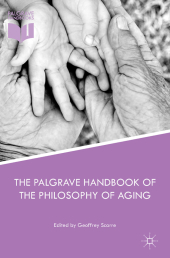 Neuerscheinungen 2019Stand: 2020-02-01 |
Schnellsuche
ISBN/Stichwort/Autor
|
Herderstraße 10
10625 Berlin
Tel.: 030 315 714 16
Fax 030 315 714 14
info@buchspektrum.de |

Geoffrey Scarre
The Palgrave Handbook of the Philosophy of Aging
Herausgegeben von Scarre, Geoffrey
Softcover reprint of the original 1st ed. 2016. 2019. ix, 559 S. 2 SW-Abb. 235 mm
Verlag/Jahr: SPRINGER PALGRAVE MACMILLAN; PALGRAVE MACMILLAN UK 2019
ISBN: 1-349-67901-1 (1349679011)
Neue ISBN: 978-1-349-67901-0 (9781349679010)
Preis und Lieferzeit: Bitte klicken
This comprehensive handbook presents the major philosophical perspectives on the nature, prospects, problems and social context of age and aging in an era of dramatically increasing life-expectancy. Drawing on the latest research in gerontology, medicine and the social sciences, its twenty-seven chapters examine our intuitions and common sense beliefs about the meaning of aging and explore topics such as the existential experience of old age, aging in different philosophical and religious traditions, the place of the elderly in contemporary society and the moral rights and responsibilities of the old. This book provides innovative and leading-edge research that will help to determine the parameters of the philosophy of aging for years to come.
Key Features
- Structured in four parts addressing the meaning, experience, ethics and future of aging
- Comprehensive ethical coverage including of the retirement age, health-care for the elderly and the transhumanist life-extending project
- Focused treatment of the dementia ´epidemic´ and the philosophy of the mind and self
The Palgrave Handbook of the Philosophy of Aging is an essential resource for scholars, researchers and advanced students in the philosophy of the self, moral and political philosophy, bioethics, phenomenology, narrative studies and philosophy of economics. It is also an ideal volume for researchers, advanced students and professionals in gerontology, health care, psychology, sociology and population studies.
Introduction
Geoffrey Scarre
Part 1 The Meaning of Aging
1. How old is old? Changing conceptions of old age
Christine Overall
2. Gerontology versus geriatrics: different ways of understanding aging and old age
Chris Gilleard and Paul Higgs
3. The physiology and psychology of aging: should aging be successful or authentic?
Julian C. Hughes
4. Concepts of time in age and aging
Jan Baars
5. The aging of people and of things
Geoffrey Scarre
6. Aging in religious perspective
Charles Taliaferro and Meredith Varie
7. Aging in classical philosophy
Audrey L. Anton
8. Old age in existentialist perspective
Kristana Arp
9. Aging and modern Jewish writing and thought
Michael Mack
Part 2 The Experience of Aging
10. The stories of our lives: aging and narrative
David Carr
11. Coming to terms with old age - and death
Christopher Cowley
12. Feeling one´s age: a phenomenology of aging
Michael Bavidge
13. Aging and the maintenance of dignity
Russell Woodruff
14. Wisdom and aging
Charles Taliaferro and Meredith Varie
15. Does self-identity persist into old age?
Helen Sm
all
16. Dementia and the nature of mind
Julian C. Hughes
17. ´This damnable, disgusting old age: aging and (being) one´s body
Christopher Hamilton
Part 3 The Ethics of Aging
18. Aging, getting older and the good life
Diane Jeske
19. Aging as becoming oneself: a philosophical ethics of later life
Thomas Rentsch
20. Filial duties
Diane Jeske
21. What do the old owe the young?
S›ren Holm
22. Benefits or burdens? The social role of the old
Andreas Kruse
23. Virtue, aging and failing
Mary Margaret McCabe
24. Ethical issues in dementia care
Chris Gilleard and Paul Higgs
Part 4 The Future of Aging
25. Health care for old age: rights, duties and expectations
Anita Silvers and Mary V. Rorty
26. How long should people work?
Audrey L. Anton
27. The transhumanist prospect: developing technology to extend the human lifespan
Christopher Wareham
Index
"The Palgrave Handbook of the Philosophy of Aging is well executed and remedies a fault in the literature. I recommend it for scholars in aging studies, regardless of whether they are psychologists, sociologists, geriatricians, or other. Among its uses are as a general text for philosophy of aging courses and as a reference for persons who work in research or a profession associated with aging." (Lauren S. Seifert, PsycCRITIQUES, Vol. 62 (26), June, 2017)


